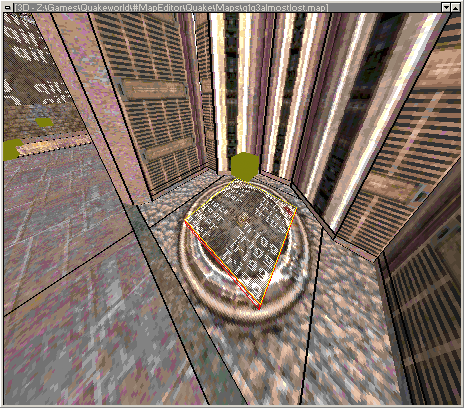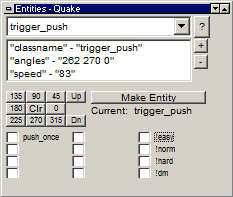Map Conversion
Few guidelines to convert quake3 maps to quakeworld + tools.
Requirements
The stuff you'll need to convert maps
Decompiler: I use the Q3Map decompiler for decompiling the brushes
currently v2.5.80 and v2.5.16.
Map editor: You can use any map editor you prefer. I use
The Quake Adapter for
Worldcraft 3.33
for replacing textures and BSP Editor .96d
to edit the map.
WAD: For converting quak3 textures to quake1 bmp's, I use T2Q batch
converter (textures 2 quake) and TexMex to create the WAD file from the bmp files. For
batch renaming files I use Ant Renamer 2.1
Compiler: The compiler I use the most are TxQBSP 1.13 with Light 1.43 and
WVIS (multithreading vis tool). When compiling in BSP Editor.
Step 1
Introduction
Converting maps are not a hard task. But it takes a lot of effort and time.
This guide is for people that at least can create a simple map in quake and
know a little about the map making. I started with the tutorial at the
BSP Quake Editor homepage
Q3 maps got a lot of effects and shaders, meaning that you'll have
to use your best mapping skill to reproduce the maps missing brushes.
You will also have to place all the Entities (items, weapons, light
etc.) in the map.
I personally use BSP Editor to do the rest of the work, but use your
preferred mapping tool.
Step 4
Jump pads
Almost every Quake3 map has jump pads in them. Quakeworld are not very jump pad friendly since the physics is a lot different. You could replace some jumps with teleports. But if you really want to have jump pads in your map, the best solution I found where using angled wind tunnels.

The trigger is a "trigger_push" and are placed on top of the jumppad texture.
You'll have to make a lot of fine tuning and testing for the placement of the trigger brush.

The settings used for the "trigger_push" is angles and speed angles takes 3 parameters which are the angles for the pushing. The speed, yes, it's the speed or power for the push trigger.
